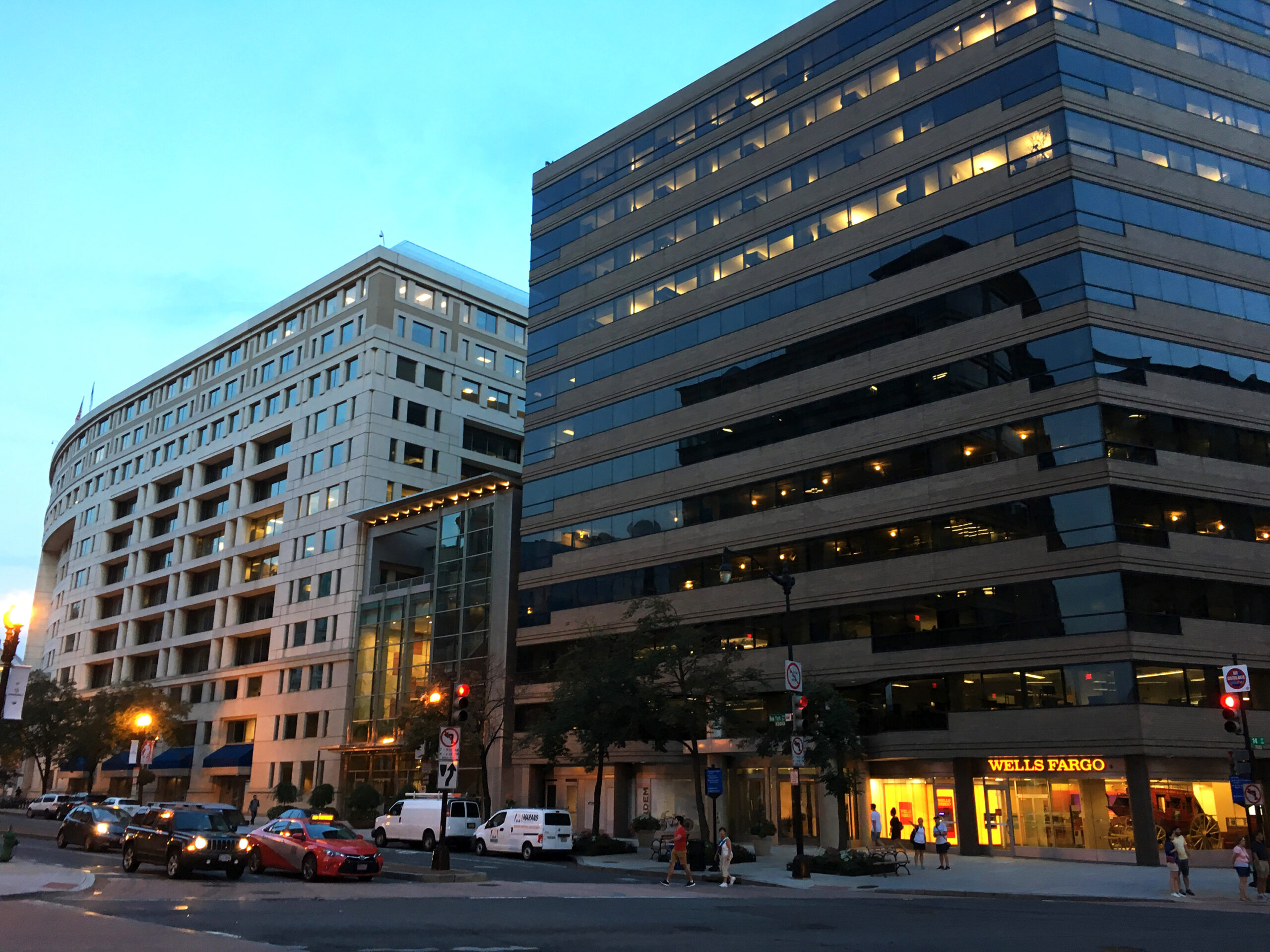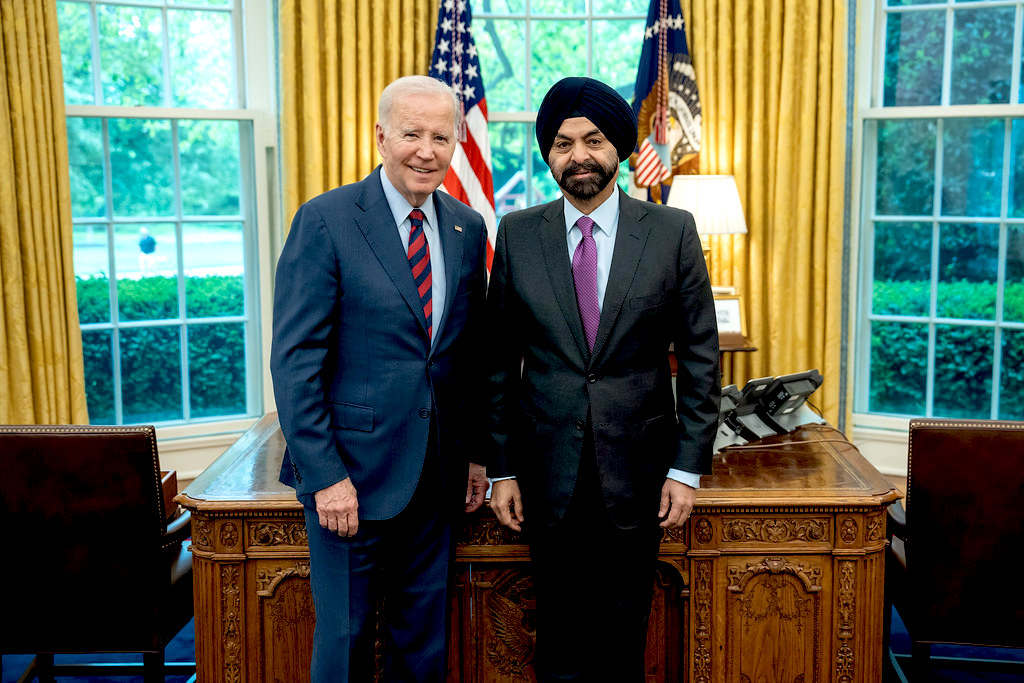A report detailing dire consequences for Indigenous people in an Ecuador province comes amid a push on new World Bank President Ajay Banga to end asupport for destructive, high-emitting livestock operations.

Inter-American Development Bank headquarters in Washington, D.C., on left. (Mario Roberto Durán Ortiz, Wikimedia Commons, CC BY-SA 4.0)
By Kenny Stancil
Common Dreams
Multilateral development banks’ financing of factory farms has unleashed significant social and ecological harm in Ecuador, according to a report published this week.
Civil society groups say the banks’ failure to consult or compensate affected Indigenous communities violates Ecuadorian law and their own policies.
Over the past 20 years, the International Finance Corporation (IFC) and IDB Invest, respectively the private sector branches of the World Bank Group and the Inter-American Development Bank (IDB) Group, have collectively poured more than $200 million into the expansion of PRONACA, Ecuador’s fourth-largest corporation and by far its biggest pork and poultry producer.
[Related: COP26: Uberizing Farms to Save the Climate]
The new analysis, assembled by the Ecuadorian Coordinator of Organizations for the Defense of Nature and the Environment (CEDENMA) with support from a coalition of international advocacy groups including Friends of the Earth and World Animal Protection, details the dire consequences of this lending in a small province west of Ecuador’s capital of Quito.
“By giving millions of dollars of public money to PRONACA, IDB Invest and the IFC are violating their own policies and causing negative impacts to Indigenous communities and fragile ecosystems in Santo Domingo de los Tsáchilas,” Kari Hamerschlag, deputy director of the Food and Agriculture Program at Friends of the Earth U.S., said in a statement.
[Related: The Lying IMF]
“This report is more evidence that every dollar spent on factory farming harms communities and jeopardizes development progress,” said Hamerschlag. “Public development banks must stop propping up a failing system, stand alongside Indigenous groups, and stop financing factory farming.”

U.S. President Joe Biden meets with newly appointed World Bank President Ajay Banga on May 4 in the Oval Office. (White House/Adam Schultz)
This is not the first time PRONACA, a meat giant operating more than 100 factory farms and slaughterhouses throughout Ecuador, has faced criticism for its deleterious social and ecological effects.
In addition to documenting the historical and ongoing destruction the company has inflicted nationwide, the new investigation highlights how public development banks (PDBs) are complicit in the despoilation of communities in Santo Domingo de los Tsáchilas, which is home to 15 factory farms.
It is based on surveys of local residents that CEDENMA, an alliance of 52 environmental groups, conducted in the wake of the most recent round of PDB lending to PRONACA.
IDB Invest provided its first loan, worth $50 million, to the company in 2020. IFC followed up with a $50 million loan of its own in 2021, though the World Bank Group’s latest PRONACA financing came on top of the $120 million it had already lent to the company.
“Our extensive interviews with community members found that PRONACA’s intensive pig farms in the Santo Domingo de los Tsáchilas region have continued to pollute the air and contaminate rivers, killing off fish which local people rely on for food and jobs, and harming local tourism,” said CEDENMA Vice President Natalia Greene.
The report estimates that PRONACA’s swine production in the area generates roughly 15 million pounds of toxic waste each day, fouling the soil, air, and waterways.
Break Law & Their Own Policies
Moreover, it examines for the first time how IFC and IDB Invest’s most recent loans to PRONACA failed to comply with Ecuadorian law and five of their own policies (Performance Standards 1, 3, 4, 6, and 7), which require them to inform Indigenous communities about new operations and compensate them for ensuing damages.
“We used to have a thriving tourism industry, and now we only have polluted air and water,” said Ricardo Calazacon, a local Indigenous leader in Santo Domingo de los Tsáchilas and a medicinal plant expert.
“The expansion of pig farms in our community will bring even more pollution to our already contaminated communities. We have filed many complaints about the company to the local authorities but they have not listened to us or done anything to resolve the problems.”
The following six-minute video summarizes many of the report’s findings.
“CEDENMA is deeply concerned about IFC and IDB Invest’s failure to adequately enforce its standards and mandates with respect to PRONACA’s severe impacts on the water and the health of locally affected Indigenous communities,” said Greene.
“We are urging the public development banks and the government to enforce their policies and laws and help resolve long-standing impacts of PRONACA’s operations on the health and well-being of Indigenous communities.”
Community members and civil society groups are calling on IFC, IDB Invest, and the Ecuadorian government to uphold their obligations and force PRONACA to monitor and clean up its pollution.
Their demands come amid a broader global campaign to get PDBs to “Stop Financing Factory Farming” (SFFF), including fresh efforts to persuade newly inaugurated World Bank President Ajay Banga to end all support for destructive, high-emitting livestock operations.
The SFFF campaign was launched in 2021 to expose how “financing industrial-scale meat and dairy operations directly contradicts PDBs’ commitments to advance the Sustainable Development Goals (SDGs) and align their lending with the Paris climate agreement.”
A major share of deforestation in Latin America over the past 50 years can be attributed to land clearing for cattle and animal feed production.
The corporate-dominated global food system is now the leading driver of biodiversity loss, and animal agriculture is responsible for nearly 20 percent of global greenhouse gas emissions. Despite this, the five largest PDBs have dumped more than $4.6 billion and counting into factory farms over the past decade.
Kenny Stancil is a staff writer for Common Dreams.
This article is from Common Dreams.
Views expressed in this article and may or may not reflect those of Consortium News.
Support CN’s Spring
Fund Drive Today


A very disturbing 6 minute video. This is happening all over the world with factory farms. The run-off is killing rivers/seas/wetlands. Another nail in the planet’s coffin.